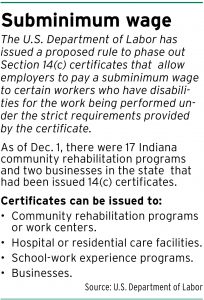Subscriber Benefit
As a subscriber you can listen to articles at work, in the car, or while you work out. Subscribe NowDue to a law created in 1938, some employees with disabilities can be paid well below the federal minimum wage of $7.25 an hour.
The U.S. Department of Labor is looking to close that legal loophole for good with a proposed rule announced in December that would phase out certificates employers can apply for under Section 14(c) of the Fair Labor Standards Act.
It’s a move that, if implemented, will codify a shift that employment law attorneys, businesses and legal observers say has been happening in Indiana and other states in recent years, in terms of paying workers with certain disabilities.

Jeff Macey, a partner with Macey Swanson LLP, said as an attorney whose practice areas include employment law, he believes most companies that employ workers with disabilities have been moving toward providing them with better pay.
“I don’t think there’s a big constituency that opposes this,” Macey said of the proposed DOL rule.
The rule proposes to gradually eliminate certificates employers can apply for that allow them to pay certain workers with disabilities subminimum wages.
“This proposal demonstrates the Biden-Harris administration’s dedication to good jobs for workers with disabilities,” said Acting Secretary of Labor Julie Su, said at the time of the December announcement. “In the decades since Section 14(c) was included in the Fair Labor Standards Act, there have been significant legal and policy developments that have dramatically expanded employment opportunities and rights for individuals with disabilities. With this proposal, the department expects that many workers currently paid subminimum wages under Section 14(c) will move into jobs that pay full wages, which will improve their economic wellbeing and strengthen inclusion for people with disabilities in the workforce.”
In its proposed rule, the department noted that since 1989, when the department’s regulations were last substantively updated to assist individuals with disabilities both in obtaining and maintaining employment at or above the full minimum wage, employers “similarly have substantially more resources and training available to recruit, hire, and retain workers with disabilities in employment at or above the full minimum wage.”

Kenneth Dau-Schmidt, professor of labor and employment law at Indiana University Maurer School of Law, said he thought only people who are actively engaged in the 14(c) program know about its existence.
Dau-Schmidt noted that, nationwide, there are about 800 employers and 40,000 workers currently engaged in the program.
He said he didn’t think it was a hot button political issue and that President-elect Donald Trump has not weighed in on the issue.
“The minimum wage is so low now relative to the market, having to pay a worker the minimum wage is not that burdensome for most employers. The subminimum wage program for disabled workers has already been done away with by a dozen states with bipartisan support,” Dau-Schmidt told Indiana Lawyer in an email.
 An anticipated change
An anticipated change
In announcing the proposed rule, the department reported that more than 90% of employers with certificates are non-profits that provide services to people with disabilities.
The U.S. Commission on Civil Rights issued a 2020 report that called on Congress to expand funding for supported employment services and prioritize capacity building in states transitioning from 14(c) programs.
The commission pointed out that the legal loophole has allowed some companies to pay their employees less than a dollar an hour.
DOL announced the proposed rule would do the following:
• Cease the department’s issuance of new Section 14(c) certificates starting on the effective date of a final rule.
• Institute a three-year period beginning on the effective date of a final rule for employers holding existing Section 14(c) certificates to gradually cease paying subminimum wages to workers with disabilities.
Kim Dodson, CEO of The Arc of Indiana, told Inside Indiana Busienss that the move had been anticipated for some time and is in line with efforts that the state of Indiana has already implemented.
“The state of Indiana has started its own transition away from the use of 14(c)’s over the last couple of years,” Dodson said. “They have a goal to end it by the end of 2027, so just having that Department of Labor push behind all of that is just really encouraging.”
The 14(c) certificate program has allowed employers to pay less than the minimum wage for workers “whose earning or productive capacity is impaired by a physical or mental disability, including those relating to age or injury,” according to the DOL.
But Dodson said over the past few years, more organizations in Indiana have worked to move away from using the certificates and have seen positive results.
In 2021, Huntington-based nonprofit Pathfinder Services announced it had requested to withdraw from future 14(c) certifications.
Pathfinder contracts with area companies through its Outsource Manufacturing division to provide training and work experience. Under the 14(c) certification, those workers were previously paid based on their production output as they learn the skills they need to succeed.
CEO Danielle Tips said the transition away from the certification was very smooth with minimal financial impact. And the response from the workers has been positive as well despite some initial growing pains.
“Just like every employee here, (workers with disabilities) get PTO. They are eligible for all of the benefits that every employee is eligible for. They take the required trainings,” she said. “But that also means with all of those rights, there also comes responsibilities. So there’s been a learning curve and some education around how do we help support and accommodate?”
Dau-Schmidt said the labor department surveyed the current participants in the program before it proposed ending it, and determined the program was no longer necessary.
The Maurer law professor added that he thought the December release of the proposed rule after the election is a matter of the Biden administration hurrying to get it done before leaving office.
How will Trump respond?
As of Dec. 20, the labor department had received 1,913 public comments regarding the proposed rule.
Dau-Schmidt said that, to his knowledge, Trump has not commented on the proposed rule.
He said he didn’t think it was in the president-elect’s sights or a point of hot political contention between the parties.
“I doubt that stopping this proposed rule is high on the agenda of Trump’s nominated Secretary of Labor, Lori Chavez-DeRemer. However, President-elect Trump is hard to predict,” Dau-Schmidt said.

John Haskin of Indianapolis-based John H. Haskin & Associates LLC, said his firm handles a lot of Americans with Disabilities Act-related litigation.
But he acknowledged that he had not heard about the DOL’s certificate program.
Haskin said the proposed DOL rule could become an issue with a new presidential administration if President-elect Donald Trump believes different federal bureaucratic agencies are overstepping their boundaries with rule-making and taking over a legislative function
from Congress.
Lori Chavez-DeRemer, a former Congressional representative from Oregon, has been tapped by Trump to be the next labor secretary.
“She is really looking to cut back on the rule making for these agencies without legislative oversight,” Haskin said.
If the Trump administration decides not to implement the proposed rule, Dau-Schmidt said he thinks individual states will continue to do away with the program by amending their state minimum wage laws.

Kent Kramer, president and CEO of Goodwill of Central & Southern Indiana, told Indiana Lawyer in an email that as one of the largest employers of persons with disabilities in the state, Goodwill’s mission is to empower these individuals to increase their independence and reach their potential.
Kramer said that’s only possible through fair wages.
“At Goodwill, our average hourly pay rate is $16.50 for all employees — well above the federal minimum wage of $7.25. Through their employment with Goodwill, many Hoosiers with disabilities have achieved independent living and/or no longer need government assistance, illustrating how the transformative power of work is changing lives right here in our community,”
Kramer said.•
Please enable JavaScript to view this content.
